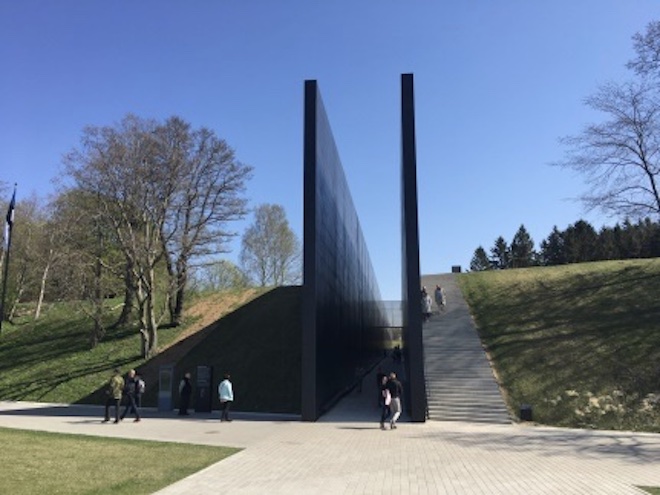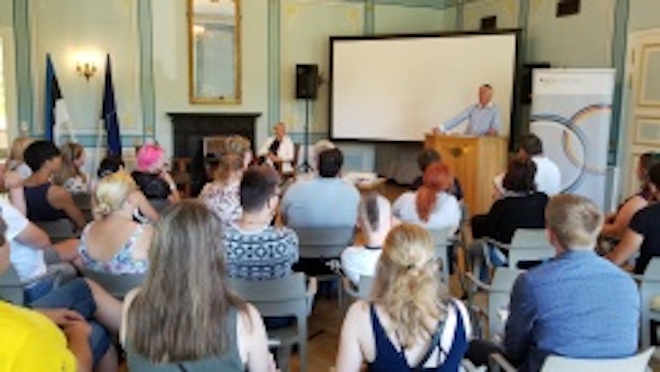The establishment of the Estonian Institute of Historical Memory was initiated by the Estonian President Toomas Hendrik Ilves in 2008. The original mission of the Institute was similar to the earlier Estonian International Commission for Investigation of Crimes Against Humanity (also known as the Max Jakobson Commission) founded by President Lennart Meri in 1998. That Commission investigated the crimes against humanity committed in Estonia during the German and Soviet occupations based on the definitions for crimes against humanity and war crimes of the 1998 Rome Statute of the International Criminal Court. The EIHM activities advance and broaden the previous Commission’s investigations and also collects data about human rights violations committed during the Soviet occupation that are not crimes against humanity by legal definition. The Institute assumes the Universal Declaration of Human Rights adopted by the United Nations in 1948 as the legal basis for its historical research.
The Institute also continues its research of life and society during the Soviet times and promotes the collection and documentation of personal histories and memories – many of which are a reminder of the oppressive impacts of the Soviet occupation.
In 2017, the Institute merged with the non-profit Unitas Foundation. This merger broadened the Institutes mandate to include the promotion of international collaboration into the research of crimes of tyrannical regimes, enhanced education and awareness and the organization of commemorative events.
Some of the recent noteworthy Institute activities include:
Maarjamäe Memorial for the Victims of Communism: The Institute was a partner in the construction of this significant memorial near Pirita. The Institute’s research was a major input to the identification of the over 22,000 Estonians victims named on the memorial. This research continues to identify additional victims through the ongoing submissions and investigations of archival records. People can search for relatives in the Memorial database via the link: https://www.memoriaal.ee

Public Exhibit “After the Great War: The new Europe 1918- 1923”: In early October the Institute arranged a major outdoor exhibit of archives and interactive displays of the turbulent socio-political times in Europe after World War I.
Summer School of the Estonian Institute of Historical Memory: The Institute hosted the annual Summer School this past summer after a one year hiatus due to the Covid pandemic. The School’s program includes lectures, review of film documentaries, museum tours, panel discussions and several excursions to historical sites that are critically relevant to the unjust actions of the Nazi and Communist regimes. Attendees come from across Europe and beyond. A separate Eesti Elu article describes this Summer School in more detail and invites more participants from Canada and the USA.
Holocaust theme Essay Contest: In January, in concert with the Estonian Ministry of Education, the institute organized a Holocaust themed essay contest for secondary school students. The winners of the contest were rewarded with a study trip the Auschwitz-Berkinau Memorial museum in Poland. The Institute organizes similar contests annually to encourage discussions of human rights and the causes and consequences of crimes of totalitarian regimes among young people.
Public Exhibit “Resistance to the Soviet regime in Estonia: 1940-1991”: In recognition of the 30th anniversary of the restoration of independence of the Baltic States, the Institute arranged compiled an exhibition in honour of those who never gave up in their hearts the hope for the end of the Soviet occupation. The Institute usually presents such exhibits in the Estonian, Russian and English languages.
European Remembrance Symposium October 26-28 (Euroopa Mälusümpoosium): The Institute recently hosted the 9th Annual Memory Symposium which brought together over 200 experts and practitioners from over 20 nations to Tallinn to share initiatives and insights on how to promote a common European memory culture. According to Sergei Melev, Board Member of the EIHM, this annual symposium is one of the most important discussion sites of Recent History in Europe.
Panel Discussion : “1944 – The Year of Difficult Choices”: In collaboration with the Institute of Human Rights, the EIHM hosted a panel discussion in October on the difficult choices that Estonians faced in 1944. With the retreating German armies and the advance of the Red Army into Estonia in the summer of 1944, Estonians made fateful decisions to either escape to the West or to remain in the home country. The cultural and political consequences of these dire choices were explored.
Patarei International Museum for the Victims of Communism: The Patarei is a former seaside fortress in Tallinn built in the mid -1800’s and which was used subsequently as a prison. The site is being restored and converted into a museum that would feature the crimes of communism that occurred in the Baltics and around the world. This Institute is a leading partner in this major project. Additional news on this project : https://mnemosyne.ee/tegevus2/kommunismikuritegude-muuseum
Additional updates of the Estonian Institute of Historical Memory (Malu Instituut) can be viewed on the Institutes web site https://mnemosyne.ee
Toomas Eichenbaum
